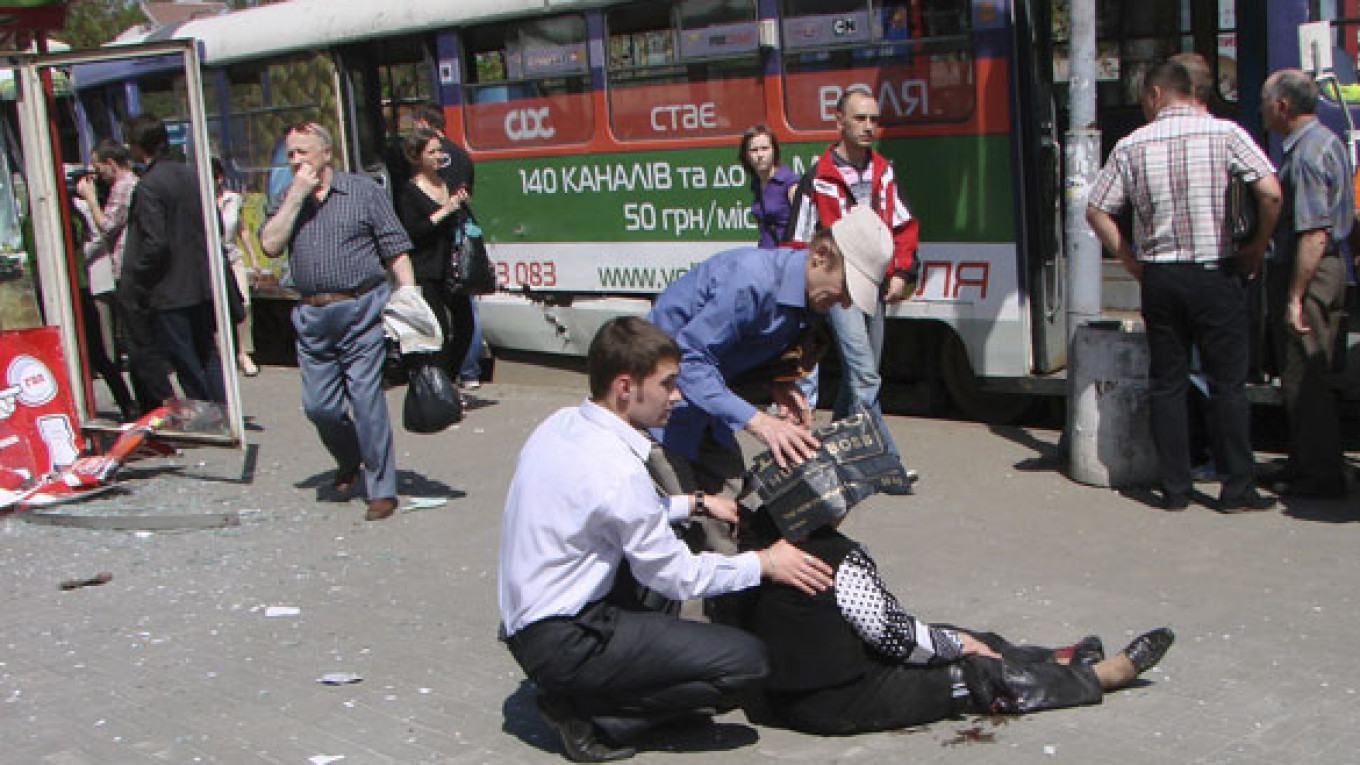KIEV — A series of blasts rocked the eastern Ukrainian city of Dnipropetrovsk on Friday, injuring 27 people, including nine teenagers, in what authorities believed was a terrorist attack.
There was no immediate claim of responsibility. But the opposition party led by jailed former Prime Minister Yulia Tymoshenko suggested that President Viktor Yanukovych's government may have organized the blasts in order to deflect the world's attention from Tymoshenko's imprisonment and reported abuse in prison.
The violence also undermines Ukraine's security weeks before it hosts the European football championships in June.
Yanukovych called the explosions "yet another challenge for the whole country" and said Ukraine's best investigators will work on the case, Interfax reported. His office did not immediately respond to the opposition charges.
Top law enforcement officials rushed to Dnipropetrovsk. Ukraine has not been afflicted with political terrorism, but there have been previous explosions connected to criminal extortion.
The first of four explosions Friday in Dnipropetrovsk rocked a tram stop shortly before noon, injuring 13 people, said Emergency Situations Ministry spokeswoman Yulia Yershova. The bomb was planted in a garbage bin.
The second bomb, also planted in a garbage bin, went off about 40 minutes later near a movie theater and a trade school, injuring two adults and nine teenagers. A third blast in the city center wounded three people and a fourth, also in downtown, caused no casualties.
Television footage showed passersby walking among broken glass trying to help a moaning victim of the tram-stop explosion, while others bandaged a bloodied arm of another victim, a middle-aged man. An elderly woman with blood on her legs lay motionless on the ground and pleaded with someone to call her daughter. Other victims were put on stretchers and transported into ambulances.
Deputy parliament Speaker Mykola Tomenko, who is a member of Tymoshenko's party, suggested that the blasts were orchestrated by the government in order to quiet Western criticism of the Tymoshenko case.
"I don't rule out that the authorities and law enforcement bodies may be among the organizers of a scenario, which involves deflecting the attention of the world and Ukraine from Tymoshenko's case on the whole and her beating in particular," Tomenko said in a statement on Tymoshenko's website.
Tymoshenko, the country's top opposition leader, is serving a seven-year prison term on charges of abuse of office in a case harshly criticized by the West as politically motivated, for she and the president are bitter rivals.
She has been on a hunger strike for a week to protest the alleged prison abuse. She claims guards punched her in the stomach and twisted her arms and legs while transporting her to a local hospital against her will to be treated for a spinal condition.
Prison officials deny mistreating Tymoshenko. But photos, which Tymoshenko's office says were taken by Ukraine's top human rights official, Nina Karpachova, of Tymoshenko in bed in her jail cell show splotches on her abdomen and lower arm.
Tymoshenko's daughter Yevhenia said Friday that Tymoshenko is very weak after refusing food for seven days and fears that she will be force-fed by prison officials.
In a previous attack in January 2011, two pre-dawn explosions outside an office of a coal-mining company and then a shopping center in the Ukrainian city of Makiivka caused no casualties. Authorities then received letters demanding money in exchange for an end to the blasts. The perpetrators were arrested and sentenced to lengthy prison terms.
A Message from The Moscow Times:
Dear readers,
We are facing unprecedented challenges. Russia's Prosecutor General's Office has designated The Moscow Times as an "undesirable" organization, criminalizing our work and putting our staff at risk of prosecution. This follows our earlier unjust labeling as a "foreign agent."
These actions are direct attempts to silence independent journalism in Russia. The authorities claim our work "discredits the decisions of the Russian leadership." We see things differently: we strive to provide accurate, unbiased reporting on Russia.
We, the journalists of The Moscow Times, refuse to be silenced. But to continue our work, we need your help.
Your support, no matter how small, makes a world of difference. If you can, please support us monthly starting from just $2. It's quick to set up, and every contribution makes a significant impact.
By supporting The Moscow Times, you're defending open, independent journalism in the face of repression. Thank you for standing with us.
Remind me later.






